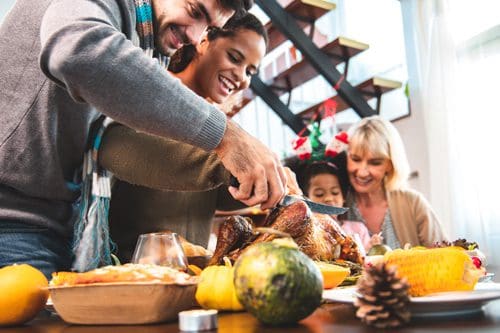Thanksgiving & Recovery
 The Thanksgiving holiday can be a tough time if you are newly sober or in recovery. In addition to turkey, stuffing, and mashed potatoes, you may find yourself surrounded by friends and family who are drinking as part of the day’s celebration.
The Thanksgiving holiday can be a tough time if you are newly sober or in recovery. In addition to turkey, stuffing, and mashed potatoes, you may find yourself surrounded by friends and family who are drinking as part of the day’s celebration.
If you are feeling nervous about going into the holidays sober, you are not alone. Fortunately, there are several ways to reduce your anxiety and stay sober during the holiday season. We offer some tips to consider:
Be prepared and plan ahead.
If you plan ahead for Thanksgiving, you can enjoy the day in a way that works best for you. Avoid any people who do not support your sobriety. If you are at a Thanksgiving celebration and it becomes uncomfortable and overwhelming, be prepared to leave. You can talk to your host in advance so they are aware of your situation. You do not want to put yourself in a situation that could jeopardize your sobriety. If you plan on staying and enjoying the day, bring a non-alcoholic beverage for yourself and to share with others.
Change how you celebrate.
Maybe in the past, Thanksgiving was a day filled with alcohol and parties. This no longer has to be how you celebrate the holiday. You can change the traditions to better fit your sobriety and recovery. Consider volunteering, take part in a community activity, or host the holiday yourself with only close family or friends who are supportive of your sobriety. With some courage and creativity, you can turn the holiday into something you look forward to celebrating each year.
Bring a sober friend.
You do not have to go to a Thanksgiving dinner alone. Take a sober friend with you who can offer support. It’s much easier to not drink at dinner when someone else is also abstaining. Check with your host first, of course, and offer to contribute to the meal to help adjust for the extra person.
Practice self-care.
Taking care of yourself is important on the holidays and every day of the year. Staying positive can make a difference in how you go about your day. You can do simple self-care activities on Thanksgiving day: take a walk, meditate, or get some rest so you are relaxed and energized for whatever comes your way.
Recognize your emotions.
If you begin to feel anxious, stressed out, or depressed, acknowledge those emotions and come to terms with them. You may also feel lonely in your newly found sobriety if you are the only one sober. Try to take time to relax and give yourself a break. It is okay to feel these emotions as long as you have healthy ways to deal with them. You might want to journal or talk with a therapist or sponsor about what you’re feeling.
Be thankful.
An important part of your Thanksgiving celebration is to be thankful for your recovery and everything you have. Showing gratitude is essential to recovery. You can show your gratitude in a variety of ways, such as voicing your gratitude with a prayer at Thanksgiving dinner, sending a special note to someone who has been supportive of you, or writing an entry in your journal on what you are grateful for to remind yourself of your accomplishments.
Avoid triggers.
The holiday season can be filled with triggers: the people, places, or things that make you want to drink again. You probably know what your triggers are, so now is the time to be vigilant in making sure you avoid them.
Reach out for support.
If you feel overwhelmed, reach out to a sponsor, hit a meeting, or confide in someone you trust. Always have a support system in place in case you need help over the holiday or anytime you are struggling.
Help Is Available
At Twin Lakes Recovery Center, we offer residential and outpatient detox programs as well as continuing care that may include meetings, outpatient programs, relapse prevention programs, therapists, and many other activities designed to help you in your recovery. We also have alumni groups and gatherings that can help you stay connected with others in recovery.
If you are struggling over the holiday season and need assistance, reach out to us: we are available 24/7. To find out more about what programs we have to offer, contact one of our addiction specialists to set up a confidential consultation.



